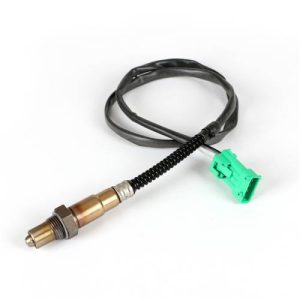Your cart is currently empty!
2003 Pontiac Vehicles 15703 Oxygen Sensor Troubleshooting Guide
Welcome, fellow automotive enthusiasts, to this comprehensive troubleshooting guide dedicated to the 2003 Pontiac Vehicles and the essential component, the 15703 Oxygen Sensor. In the quest for optimal vehicle performance and emission control, understanding and maintaining the oxygen sensor is of utmost importance. This article will delve into the intricacies of the 2003 Pontiac Vehicles' oxygen sensor system, helping you diagnose and troubleshoot issues like a seasoned professional.

The Significance of Oxygen Sensors in 2003 Pontiac Vehicles
The Role of 15703 Oxygen Sensors
In the realm of automotive engineering, 15703 oxygen sensors play a pivotal role in monitoring the oxygen levels within the exhaust gases. In the case of 2003 Pontiac Vehicles, the 15703 Oxygen Sensor performs this crucial function, providing essential data to the vehicle's engine control module (ECM). This data assists the ECM in adjusting the air-to-fuel ratio, ultimately ensuring efficient fuel combustion and minimizing harmful emissions.
Common Symptoms of a Failing 15703 Oxygen Sensor
As a responsible car owner, it is crucial to be aware of the warning signs indicating a failing oxygen sensor. Typical symptoms include a decline in fuel efficiency, rough idling, or engine hesitation. Furthermore, illuminated check engine lights might be indicative of potential oxygen sensor issues in your 2003 Pontiac Vehicles. Ignoring these warning signs can lead to more severe engine problems and increased emissions.
Troubleshooting the 15703 Oxygen Sensor
When dealing with oxygen sensor issues, it is essential to follow a systematic approach. Begin by inspecting the sensor for any physical damage or contamination. A dirty or faulty oxygen sensor might not provide accurate readings, leading to improper fuel adjustments. Cleaning or replacing the sensor may resolve minor issues and restore optimal performance.
In addition to a visual inspection, using an OBD-II scanner can help retrieve error codes from the vehicle's ECM. These codes will offer valuable insights into the specific problem affecting the oxygen sensor. However, it's crucial not to jump to conclusions solely based on the error codes. Conduct further tests to validate the sensor's functionality accurately.
Effective Testing and Replacement Techniques
Testing the Oxygen Sensor
To verify the 15703 Oxygen Sensor's functionality, you can employ a multimeter to measure its voltage output. A healthy oxygen sensor should oscillate between high and low voltages as the engine runs. This oscillation indicates that the sensor is capable of detecting changes in oxygen levels and providing real-time feedback to the ECM.
If the sensor's voltage output remains steady or shows no significant variation, it is likely malfunctioning and requires replacement. Remember, conducting these tests while the engine is at operating temperature will yield more accurate results.
Replacing the 15703 Oxygen Sensor
When replacing the oxygen sensor, always use OEM (Original Equipment Manufacturer) or high-quality aftermarket parts. This ensures compatibility and longevity, preserving the performance of your 2003 Pontiac Vehicles.
To begin, locate the 15703 oxygen sensor, typically situated along the exhaust pipe. Carefully disconnect the electrical connector and utilize an appropriate wrench to remove the sensor. Apply anti-seize compound to the new sensor's threads to prevent future complications during replacements. Install the new sensor and reconnect the electrical connector, taking care not to damage the wires.
Upon successful replacement, clear any stored error codes with the OBD-II scanner, and conduct a final test to ensure the sensor is functioning correctly.
conclusion
the 15703 Oxygen Sensor is a critical component of the 2003 Pontiac Vehicles, impacting fuel efficiency, emissions, and overall engine performance. Regularly inspecting, testing, and maintaining this sensor will contribute to a smooth-running vehicle and reduced environmental impact.
Remember, accurate diagnosis and troubleshooting of the oxygen sensor will not only save you time and money but also contribute to a healthier and more efficient driving experience. Stay proactive, and happy driving with your well-maintained 2003 Pontiac Vehicles!






Leave a Reply